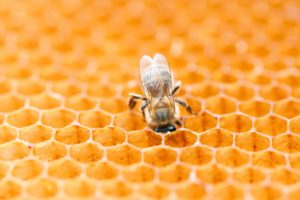The COVID-19 pandemic has caused many of us to shift our priorities. However, one priority that shouldn’t change is your commitment to your health. Learn how to continue venom immunotherapy treatment during the pandemic with advice from an allergy expert. Then, read about the COVID-19 vaccine and recommendations for people with known severe allergies.
The Importance of Continuing Treatment for Bee Sting Allergies
Like many, you may have been avoiding public spaces. In fact, you may be choosing to spend time outdoors instead. Being outdoors is essential for our physical and mental health; but, for the 5-7.5% of Americans who are hypersensitive to bee stings, extra time outdoors can leave you more at risk for an allergic reaction.4
Venom immunotherapy gradually increases your resistance and immunity to bee stings. Stopping treatment too early can leave you vulnerable to an allergic reaction.6 Plus, if you are one of the many people who forget to carry their epinephrine auto-injectors at all times, then you’re putting yourself at even more risk.7 If you have an allergic reaction, you may need to go to the ER. During these difficult times, many hospitals are busier than usual. Now is not the time to stop treatment but to be extra diligent.

ADVICE FROM AN ALLERGY EXPERT: COVID-19 AND VENOM IMMUNOTHERAPY
We asked allergy expert Marc Thomas (RN) to offer his insights on allergy immunotherapy during the COVID-19 pandemic. Marc has been a nurse for over 40 years specializing in both allergy and emergency medicine.
Q: I currently carry an epinephrine auto-injector. Why should I consider (or continue) VIT?
A: I can tell you this, I would much rather prevent those reactions than deal with the consequences. One should not rely on an epinephrine auto-injector alone. With venom immunotherapy being [up to] 98% effective, any patient with a whole-body reaction needs to look into this treatment.3 And those who are on it need to maintain it during this pandemic.
Q: I am concerned about COVID-19. Is it safe for me to go to my allergy doctor for diagnosis or shots?
A: No doubt you may have some fear of going to the doctor right now, but don’t let that stand in your way of this life-saving treatment.
THE COVID-19 VACCINE & ALLERGY PATIENTS
Allergic reactions to the COVID-19 vaccine are making headlines. And for some, these headlines trigger scary memories.
People who have experienced a severe allergic reaction to a medication, environmental allergen, or stinging insect know how frightening it is. And those who receive allergy shots may have more questions about the vaccine, including their risk for anaphylaxis. Others wonder if a previous adverse reaction means they’re at a higher risk of another from the vaccine. Some of the answers to these questions are more involved. But in short, the answer is no. You are not at a higher risk.
COVID-19 Vaccine Allergic Reactions
Per the Emergency Use Authorization (EUA) of the Pfizer-BioNtech COVID-19 vaccine, there is a remote chance of having a severe reaction. However, allergic reactions to vaccines are rare. In fact, studies estimate vaccine-related anaphylaxis occurs in 1.31 per 1 million doses. Furthermore, the American Academy of Otolaryngic Allergy claims individuals with common allergies (medications, foods, inhalants, insects, and latex) are no more likely to have an allergic reaction to the COVID-19 vaccine than the general public.
Managing Adverse Reactions
Your vaccine provider is educated on the signs of a severe allergic reaction and should have epinephrine on-hand in case of an emergency. However, if you typically carry an epinephrine auto-injector, make sure to have it with you at your vaccination appointment. If a severe reaction occurs, it usually starts within 15-30 minutes of vaccination. As a result, your provider will ask that you stay for monitoring.
If you have specific questions about your health or the vaccine, contact your preferred local healthcare provider.
Read the vaccine ingredient lists on the CDC website by opening the fact sheet for each vaccine.

NERVOUS? TALK TO YOUR ALLERGIST.
Whether you’re looking to start venom immunotherapy right now or questioning whether you should continue treatment during the COVID-19 pandemic, talk to your doctor. Here are a few tips to get you started:
- Take some time to write down your concerns and questions beforehand.
- Make sure to ask what precautions your doctor’s office is taking to prevent the spread of COVID-19.
- Confidently advocate for yourself because your health matters!






